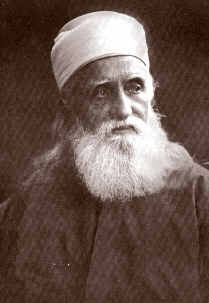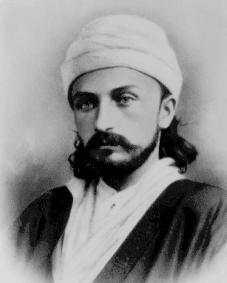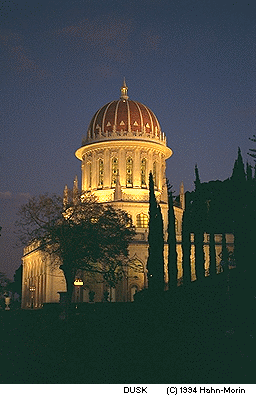Abdu'l-Baha was the natural son of the Prophet Baha'u'llah, and appointed by Him as the "Center" of His Covenant, to whom the Baha'is should turn after His passing (1892). To the Baha'is he provided wisdom, guidance, and interpretation, and the example of a saintly life. Indeed, he could be an example for all humanity, as to how a human being could live with nobility, integrity and humility. He was born on the very evening that the Baha'i Revelation began, May 23, 1844, and passed away in 1921, nine years after his visit to America.
"Seldom have I seen one whose appearance impressed me more. A tall strongly-built man holding himself straight as an arrow, with white turban and raiment, long black locks reaching almost to the shoulder, broad powerful forehead indicating a strong intellect combined with an unswerving will, eyes keen as a hawk's, and strongly-marked but pleasing features such was my first impression of `Abbás Effendi, 'the master' as he par excellence is called.... One more eloquent of speech, more ready of argument, more apt of illustration, more intimately acquainted with the sacred books of the Jews, the Christians, and the Muhammadans, could, I should think, scarcely be found even amongst the eloquent, ready, and subtle race to which he belongs. These qualities, combined with a bearing at once majestic and genial, made me cease to wonder at the influence and esteem which he enjoyed even beyond the circle of his father's followers. About the greatness of this man and his power no one who had seen him could entertain a doubt."
(Prof. Edward Granville Browne, Cambridge University scholar, initially met `Abdu'l-Bahá in 1890, and came to know Him well.)

`Abdu'l-Bahá in Paris in 1912 |

`Abdu'l-Bahá as a young man |
Search out their books, and let their glorious peace-bringing, love creating words and lessons sink into your hearts as they have into mine." — Queen Marie of Romania (Rumania)—renowned granddaughter of Queen Victoria. (photo) She was the first crowned head to become a Bahá'í. Originally the Princess Marie of Edinburgh, she was grand-daughter to Queen Victoria, the only ruler among those addressed by Bahá'u'lláh who did not give a wholly negative response to His message.
Abdu'l-Baha will surely unite the East and the West, for He walks
the mystical path with practical feet.
Dr. David Starr Jordan -- a Baha'i, scientist, educator,
writer, institution builder and first
President of Stanford University. (1,
2,
3)
If there were no other testimony to the truth of the above words by David Starr Jordan, the story of Abdu'l-Baha's funeral would suffice. One Christian who spoke at the funeral, feeling the overwhelming sense of loss to both the East and the West, expressed the universal sentiment of the ten-thousand people who were present at the funeral in these words: "Our father has left us!"
Shoghi Effendi, Abdu'l-Baha's grandson,
and Guardian of the Baha'i Faith, has given us the following account:
The news of His passing, so sudden, so unexpected,
spread like wildfire throughout the town [Haifa], and was flashed instantly
over the wires to distant parts of the globe, stunning with grief the community
of the followers of Baha'u'llah in East and West. Messages from far
and near, from high and low alike, through cablegrams and letters, poured
in conveying. . . expressions of praise, of devotion,
of anguish and of sympathy.
The British Secretary of State for the Colonies,
Mr. Winston Churchill, telegraphed immediately to the High Commissioner
for Palestine, Sir Herbert Samuel, instructing him to "convey to the
Baha'i Community, on behalf of His Majesty's Government, their sympathy
and condolence." Viscount Allenby, the High Commissioner for
Egypt, wired the High Commissioner for Palestine asking him to "convey
to the relatives of the late Sir Abdu'l-Baha
Abbas Effendi and to the Baha'i Community" his "sincere sympathy in the
loss of their revered leader." The Council of Ministers in Baghdad
instructed the Prime Minister Siyyid Abdu'r-Rahman to extend their "sympathy
to the family of His Holiness Abdu'l-Baha in their bereavement." The
Commander-in-Chief of the Egyptian Expeditionary Force, General Congreve,
addressed to the High Commissioner for Palestine a message requesting him
to "convey his deepest sympathy to the family of the late Sir Abbas
Baha'i." General Sir Arthur Money, former Chief Administrator
of Palestine, wrote expressing his sadness, his profound respect and his
admiration for Him as well as his sympathy in the loss which His family
had sustained. One of the distinguished figures in the academic life
of the University of Oxford, a famous professor and scholar, wrote on behalf
of himself and his wife: "The passing beyond the veil into fuller
life must be specially wonderful and blessed for One Who has always fixed
His thoughts on high, and striven to lead an exalted life here below."
Many and divers newspapers, such as the London
"Times," the "Morning Post," the "Daily Mail," the "New York World," "Le
Temps," the "Times of India" and others, in different languages and countries,
paid their tribute to One Who had rendered the Cause of human brotherhood
and peace such signal and imperishable services.
The High Commissioner, Sir Herbert Samuel,
sent immediately a message conveying his desire to attend the funeral in
person, in order as he himself later wrote, to "express my respect for
His creed and my regard for His person." As to the funeral itself,
which took place on Tuesday morning -- a funeral the like of which Palestine
had never seen - no less than ten thousand people participated representing
every class, religion and race in that country. "A great throng,"
bore witness at a later date, the High Commissioner himself, "had gathered
together, sorrowing for His death, but rejoicing also for His life."
Sir Ronald Storrs, Governor of Jerusalem at the time, also wrote in describing
the funeral: "I have never known a more united expression of
regret and respect than was called forth by the utter simplicity of the
ceremony."
The coffin containing the remains of Abdu'l-Baha
was borne to its last resting-place on the shoulders of His loved ones.
The cortege which preceded it was led by the City Constabulary Force, acting
as a Guard of Honor, behind which followed in order the Boy Scouts of the
Muslim and Christian communities holding aloft their banners, a company
of Muslim choristers chanting their verses from the Qur'an, the chiefs
of the Muslim community headed by the Mufti, and a number of Christian
priests, Latin, Greek and Anglican. Behind the coffin walked the
members of His family, the British High Commissioner, Sir Herbert Samuel,
the Governor of Jerusalem, Sir Ronald Storrs, the Governor of Phoenicia,
Sir Stewart Symes, officials of the government, consuls of various countries
resident in Haifa, notables of Palestine, Muslim, Jewish, Christian and
Druze, Egyptians, Greeks, Turks, Arabs, Kurds, Europeans and Americans,
men, women and children. The long train of mourners, amid the sobs
and moans of many a grief-stricken heart, wended its slow way up the slopes
of Mt. Carmel to the Mausoleum of the Bab.
Close to the eastern entrance of the Shrine,
the sacred casket was placed upon a plain table, and, in the presence of
that vast concourse, nine speakers, who represented the Muslim, the Jewish
and Christian Faiths, and who included the Mufti of Haifa, delivered their
several funeral orations. These concluded, the High Commissioner
drew close to the casket, and, with bowed head fronting the Shrine, paid
his last homage of farewell to Abdu'l-Baha: the other officials of
the Government followed his example. The coffin was then removed
to one of the chambers of the Shrine, and there lowered, sadly and reverently,
to its last resting-place in a vault adjoining that in which were laid
the remains of the Bab.
During the week following His passing, from
fifty to a hundred of the poor of Haifa were daily fed at His house, whilst
on the seventh day corn was distributed in His memory to about a thousand
of them irrespective of creed or race. On the fortieth day an impressive
memorial feast was held in His memory, to which over six hundred of the
people of Haifa, Akka and the surrounding parts of Palestine and Syria,
including officials and notables of various religions and races, were invited.
More than one hundred of the poor were also fed on that day.
One of the assembled guests, the Governor
of Phoenicia, paid a last tribute to the memory of Abdu'l-Baha in the following
words: "Most of us here have, I think, a clear picture of Sir Abdu'l-Baha
Abbas, of His dignified figure walking thoughtfully in our streets, of
His courteous and gracious manner, of His kindness, of His love for little
children and flowers, of His generosity and care for the poor and suffering.
So gentle was He, and so simple, that in His presence one almost forgot
that He was also a great teacher, and that His writings and His conversations
have been a solace and an inspiration to hundreds and thousands of people
in the East and in the West."
Thus was brought to a close the ministry of
One Who was the incarnation, by virtue of the rank bestowed upon Him by
His Father, of an institution that has no parallel in the entire field
of religious history, a ministry that marks the final stage in the Apostolic,
the Heroic and most glorious Age of the Dispensation of Bahá'u'lláh.
The first cablegram to London from the British General who captured
Haifa from the Ottoman Turkish Empire, was to "notify the world that
Abdu'l-Baha is safe," -- a testimony to the recognition of Abdu'l-Baha's
station.
. . . Lord Lamington, who immediately wrote to the Foreign Office to "explain the importance of Abdu'l-Baha's position;" on the despatch which the Foreign Secretary, Lord Balfour, on the day of the receipt of this letter, sent to General Allenby, instructing him to "extend every protection and consideration to Abdu'l-Baha, His family and His friends;" on the cablegram subsequently sent by the General, after the capture of Haifa, to London, requesting the authorities to "notify the world that Abdu'l-Baha is safe;" on the orders which that same General issued to the General Commanding Officer in command of the Haifa operations to insure Abdu'l-Baha's safety, thus frustrating the express intention of the Turkish Commander-in-Chief (according to information which had reached the British Intelligence Service) to "crucify Abdu'l-Baha and His family on Mt. Carmel" in the event of the Turkish army being compelled to evacuate Haifa and retreat northwards. (Shoghi Effendi: God Passes By, p: 306) As to the most great characteristic of the revelation of Baha'u'llah, a specific teaching not given by any of the Prophets of the past: It is the ordination and appointment of the Center of the Covenant. By this appointment and provision He has safeguarded and protected the religion of God against differences and schisms, making it impossible for anyone to create a new sect or faction of belief. To ensure unity and agreement He has entered into a Covenant with all the people of the world, including the interpreter and explainer of His teachings, so that no one may interpret or explain the religion of God according to his own view or opinion and thus create a sect founded upon his individual understanding of the divine Words.
(Click here) to read A Description of `Abdu'l-Bahá in the Words of His Father, Baha'u'llah.

Shrine of the Báb on Mt. Carmel, Haifa, Israel
(where Abdu'l-Baha's body was laid to rest)
(Eulogies from Christian, Jewish, and Muslim leaders: Abdu'l-Baha's funeral-- also see a photograph of the funeral)
To read some of the teachings of Abdu'l-Baha, see Some Answered Questions -- Sample topics below include:
The Influence of the Prophets in the Evolution of Humanity
1: NATURE
IS GOVERNED BY ONE UNIVERSAL LAW
2: PROOFS
AND EVIDENCES OF THE EXISTENCE OF GOD
3: THE
NEED OF AN EDUCATOR
4: ABRAHAM
5: MOSES
6: CHRIST
7: MUHAMMAD
8: THE
BÁB
9: BAHÁ'U'LLÁH
10: TRADITIONAL
PROOFS EXEMPLIFIED FROM THE BOOK OF DANIEL
11: COMMENTARY
ON THE ELEVENTH CHAPTER OF THE REVELATION OF ST. JOHN
12: COMMENTARY
ON THE ELEVENTH CHAPTER OF ISAIAH
13: COMMENTARY
ON THE TWELFTH CHAPTER OF THE REVELATION OF ST. JOHN
14: SPIRITUAL
PROOFS
15: TRUE
WEALTH
Some Christian Subjects
16: OUTWARD
FORMS AND SYMBOLS must be used to convey INTELLECTUAL CONCEPTIONS
17: THE
BIRTH OF CHRIST
18: THE
GREATNESS OF CHRIST IS DUE TO HIS PERFECTIONS
19: THE
BAPTISM OF CHRIST
20: THE
NECESSITY OF BAPTISM
21: THE
SYMBOLISM OF THE BREAD AND THE WINE
22: MIRACLES
23: THE
RESURRECTION OF CHRIST
24: THE
DESCENT OF THE HOLY SPIRIT UPON THE APOSTLES
25: THE
HOLY SPIRIT
26: THE
SECOND COMING OF CHRIST AND THE DAY OF JUDGMENT
27: THE
TRINITY
28: EXPLANATION
OF VERSE 5, CHAPTER 17, OF THE GOSPEL OF ST. JOHN
29: EXPLANATION
1ST CORINTHIANS 15:22
30: ADAM
AND EVE
31: EXPLANATION
OF BLASPHEMY AGAINST THE HOLY SPIRIT
32: EXPLANATION
OF THE VERSE "FOR MANY ARE CALLED BUT FEW ARE CHOSEN"
33: THE
"RETURN" SPOKEN OF BY THE PROPHETS
34: PETER'S
CONFESSION OF FAITH
35: PREDESTINATION
On the Powers and Conditions of the Manifestations
of God
36: THE
FIVE ASPECTS OF SPIRIT
37: THE
DIVINITY CAN ONLY BE COMPREHENDED THROUGH THE DIVINE MANIFESTATIONS
38: THE
THREE STATIONS OF THE DIVINE MANIFESTATIONS
39: THE
HUMAN CONDITION AND THE SPIRITUAL CONDITION OF THE DIVINE MANIFESTATIONS
40: THE
KNOWLEDGE OF THE DIVINE MANIFESTATIONS
41: THE
UNIVERSAL CYCLES
42: THE
POWER AND INFLUENCE OF THE DIVINE MANIFESTATIONS
43: THE
TWO CLASSES OF PROPHETS
44: EXPLANATION
OF THE REBUKES ADDRESSED BY GOD TO THE PROPHETS
45: Explanation
of the verse of the The Kitab-i-Aqdas:
"There
is No Partner for Him Who is the Dayspring of Revelation in His Most Great
Infallibility"
On the Origin, Powers & Conditions of Man
46: MODIFICATION
OF SPECIES
47: THE
UNIVERSE IS WITHOUT BEGINNING; THE ORIGIN OF MAN
48: THE
DIFFERENCE EXISTING BETWEEN MAN AND ANIMAL
49: THE
GROWTH AND DEVELOPMENT OF THE HUMAN RACE
50: SPIRITUAL
PROOFS OF THE ORIGIN OF MAN
51: THE
SPIRIT AND MIND OF MAN HAVE EXISTED FROM THE BEGINNING
52: THE
APPEARING OF THE SPIRIT IN THE BODY
53: THE
RELATION BETWEEN GOD AND THE CREATURE
54: ON
THE PROCEEDING OF THE HUMAN SPIRIT FROM GOD
55: SOUL,
SPIRIT AND MIND
56: THE
PHYSICAL POWERS AND THE INTELLECTUAL POWERS
57: THE
CAUSES OF THE DIFFERENCES IN THE CHARACTERS OF MEN
58: THE
DEGREE OF KNOWLEDGE POSSESSED BY MAN AND THE DIVINE MANIFESTATIONS
59: MAN'S
KNOWLEDGE OF GOD
60: THE
IMMORTALITY OF THE SPIRIT (1)
61: THE
IMMORTALITY OF THE SPIRIT (2)
62: PERFECTIONS
ARE WITHOUT LIMIT
63: THE
PROGRESS OF MAN IN THE OTHER WORLD
64: THE
STATE OF MAN AND HIS PROGRESS AFTER DEATH
65: EXPLANATION
OF A VERSE IN THE KITÁB-I-AQDAS
"...whoso
is deprived thereof, hath gone astray, though he be the author of every
righteous deed."
66: THE
EXISTENCE OF THE RATIONAL SOUL AFTER THE DEATH OF THE BODY
66B: THE
IMMORTALITY OF CHILDREN
67: ETERNAL
LIFE AND ENTRANCE INTO THE KINGDOM OF GOD
68: FATE
69: THE
INFLUENCE OF THE STARS
70: FREE
WILL
71: VISIONS
AND COMMUNICATION WITH SPIRITS
72: HEALING
BY SPIRITUAL MEANS
73: HEALING
BY MATERIAL MEANS
Miscellaneous Subjects
74: THE
NONEXISTENCE OF EVIL
75: TWO
KINDS OF TORMENT
76: THE
JUSTICE AND MERCY OF GOD
77: THE
RIGHT METHOD OF TREATING CRIMINALS
78: STRIKES
79: THE
REALITY OF THE EXTERIOR WORLD
80: REAL
PREEXISTENCE
81: REINCARNATION
82: PANTHEISM
83: THE
FOUR METHODS OF ACQUIRING KNOWLEDGE
84: THE
NECESSITY OF FOLLOWING THE TEACHINGS OF THE DIVINE MANIFESTATIONS
Click here to see an interesting article
on the influence of Abdu'l-Baha on Kahlil Gibran
Click here to see the portrait
of Abdu'l-Baha in a hallway within the seat of the Universal House
of Justice.
Return to top
Return to Home page
Return to top of UN talk
(use BACK button on browser to return to exact location in previous document)